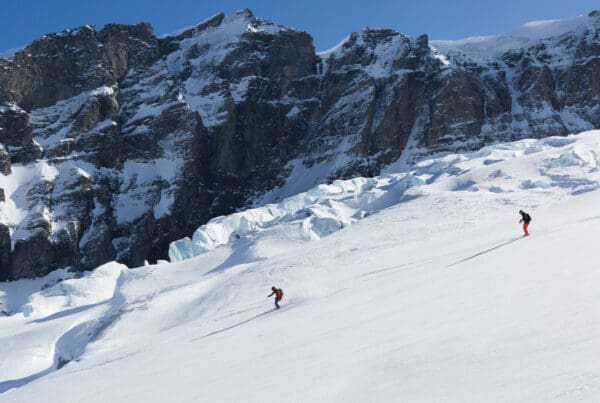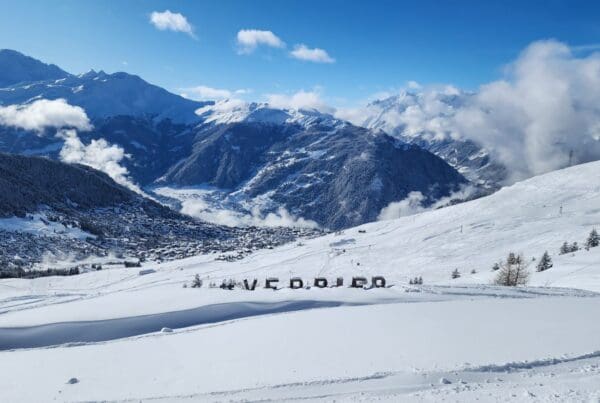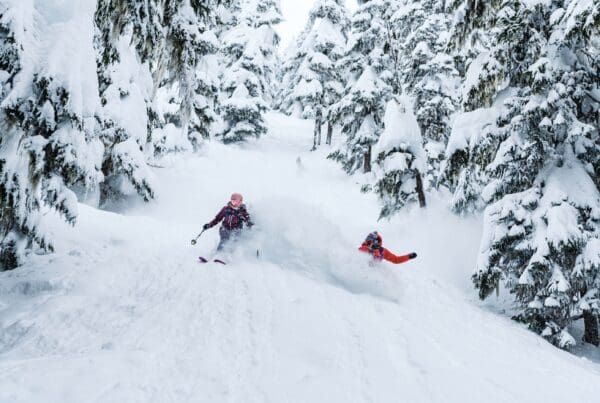★ Living in a powder paradise ★
Although he is a former French boardercross champion, Powder Extreme off-piste coach Antoine Blaizeau’s favourite mountain environment is deep snow. And, rather than compete, he much prefers to share his knowledge with other skiers and snowboarders.
Verbier has a great reputation for off-piste skiing. Why is it so good?
When I was touring the Alps competing in Europa Cup snowboard races, I got the chance to ride many resorts, and when I first came to Verbier, I was blown away. One of the big things is that has so much for every level, whether you’re learning to do your first turns off-piste or you are going extreme. It’s also not dependent on the weather. If it’s sunny, there is high alpine terrain but if it is snowing or there’s a white-out, there are areas in the trees such as Bruson or Savoleyres. The only limitation here is the avalanche risk. Even recently, when we had heavy snow and high winds – making higher areas dangerous – we could still have perfectly safe but long 1,000m vertical descents from La Chaux to Le Châble because the incline is not steep.
How accessible is the off-piste in Verbier?
It’s very easily reached by lift. Often you simply traverse away from a piste or hike for five minutes up to a ridge – no problem. The big difference to Chamonix, for example, is that because the off-piste routes are so well linked, you can do many descents in one day, without having to walk or take the bus back to do another one. Verbier is a freeride resort more than a ski mountaineering resort – they are shorter, more fun routes.
So people shouldn’t be put off by the term “freeriding” – it’s not just a hipster word for “off-piste skiing”?
No, I use it to mean a day of shorter, varied runs, which doesn’t put so much pressure on you. If you are going to challenge yourself with a steeper run, for example, it’s much better to do it on a short run, with a potential escape route, rather than committing a whole day at that level.
What would a typical Powder Extreme day with a Ski Verbier Exclusive client involve?
There is no such thing as a typical day in our private sessions: we will do what the client wants to do. If they simply want to have a great day out, find some good lines and have us take them to some of our secret stashes for fresh tracks, we can do that. Or we can coach them to help them improve their technique and push them to challenge them with some more difficult terrain.
A lot of skiers feel there is a big technical barrier between piste and off-piste skiing. What are the techniques you concentrate on?
That is the big misconception we have to help with. People feel they have to ski differently off piste but you don’t. In fact, common mistakes, such as trying to shift your weight to the back of the skis, are what then force you to ski differently, because you then struggle, trying to force the skis around, which, in turn, tires you out. The main thing I teach is to stop making the unnecessary movements (rotating the hips or trying to jump out of the snow) that make everything harder.
What’s the best way to progress to steeper and deeper off-piste terrain?
It’s my job as your guide and coach to challenge you the right amount. If I were to try to make you ski something that is too far beyond your confidence level, we would lose a lot of the progress you’ve made to reach that point. My fellow coaches at Powder Extreme are very experienced, not only in assessing the conditions and external risks, but the capability of our clients too. Safety is our number-one priority.
Is avalanche safety is a major factor?
Yes, of course, we are checking conditions every day and evaluating where the safe areas to ski are. We don’t talk about it all the time, because we don’t want to make our clients nervous when there’s no need to but if someone asks why we we are not skiing a certain area, we can explain the factors. And if people want a really good education on the whole subject, we offer the ISTA Discovery certificate – a one-day training course designed by the International Snow Training Academy. It’s a really good course, with clear explanations, and it makes it a lot easier to make decisions for yourself – and I mean positive decisions based on understanding, not just negative decisions based on fear. And it’s not classroom-based – you do it out on the mountain, so it’s fun.
Has it been a good season for off-piste?
We had an amazing start but then it wasn’t the best around Christmas. But from New Year onwards the conditions have been fantastic and – the key factor – it has stayed cold, which has preserved what we have, plus we’ve had regular top-ups. That is forecast to continue, so there should be a very strong base to keep things going to the end of the season.






